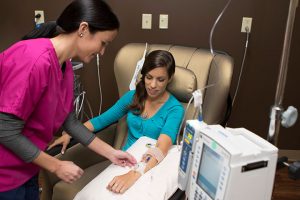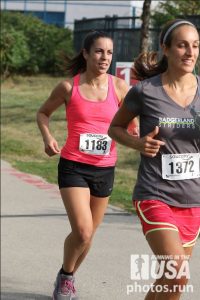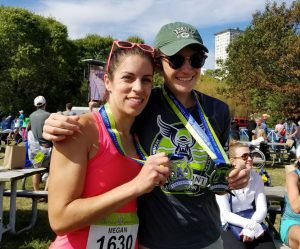By Megan Starshak, Kelley Kinetics Athlete
My story of running and my story of disease are intimately connected. In 2002, I was out on a run on the beach, when I had to find a bathroom, and urgently. Ten minutes later in the run, the feeling struck again. And again. My first signs that something was wrong. Running was there at the start of my journey with Ulcerative Colitis (UC), and it will be there in the end. Both have been integral in changing the course of my life, and in changing who I am as a person. Running has helped provide the strength I need to handle a chronic disease such as this. Alternatively, the strength I’ve gained from my disease, I have been able to put back into running. They are infinitely intertwined.
Ulcerative Colitis is a type of Inflammatory Bowel Disease (IBD) in which my immune system attacks my digestive system, causing ulcers and inflammation. Although this affects every patient differently, for me, symptoms were extreme abdominal pain, sudden and urgent bowel movements which are often loose and bloody, and levels of fatigue I didn’t know were possible. I was formally diagnosed just months before starting college at Marquette, and my plans to continue running and being active were quickly swept out from under my feet, by a disease I didn’t really know, and couldn’t have predicted would change me in so many ways.

Symptoms ravaged my life for over half a decade until eventually, I found a treatment called Remicade, and it has been my miracle drug. But that’s a whole ‘nother story. It took some time to find the exact right dose for me, and it took some time, emotionally, for me to realize that I was in a deep remission, that my symptoms were at bay and I could finally put my effort and energies into, well, just being myself and doing what I wanted to do. And that included running.
I finally picked up my running shoes again in 2012, a full decade after diagnosis, and registered for the Door County Half Iron, with the goal to simply finish, which I did. Slowly. Then I started doing a few half marathons, and started to see my times drop. I hit my then-PR at the Napa to Sonoma Half Marathon, where I ran and fundraised for the Crohn’s and Colitis Foundation’s Team Challenge program. How incredibly empowering to feel strong again. To feel like myself again. Then, in 2015, it was time. I signed up for my first marathon. I was all in, and I let what was once a goal, then a distant dream, come back to life.
During that training cycle, I hit an unexpected and really satisfying PR at the Estabrook Half Marathon. That spark back in full force, and I wanted to keep it alive. However, shortly after, I ended up with some knee pain due to overuse and muscle imbalance, with 8 weeks still to go. That year’s marathon ended well, all things considered. Okay, those things included replicating many of my run workouts on a bike, and only hitting the pavement when I could, often only 8 to 10 miles a week. It also included hours and hours and hundreds of dollars in physical therapy. I was happy, but I also wondered how much better it could have been without my injury. I definitely wanted another chance to see what I could do.
In 2017, I registered for the Lakefront Marathon, with the time goal of 3:30, giving me a bit of a bumper to qualify for Boston in my age group at 3:35. Not to mention, just a badass time.
Something that could make me say, “I did it. I hit this goal. UC took this away from me, but this time, I took it back.”
Being a patient of a chronic illness has taught me more lessons than I can sum up. It’s a lot of pain and agony and strength and wisdom. It’s strength and wisdom because of the pain and agony. You can’t separate them, and you can’t choose to not have IBD, so you have to take all of it together. For me, looking back on the extremely tough times drives me to live the good times.

I had my energy, my health, my quality of life taken away for years and years – I often mentally prepared myself for a life where I would never again know health, and know what ‘normal’ felt like. (spoiler alert: there’s no such thing as ‘normal’). But because I’m blessed to have found an incredible treatment option, I got it all back. And I’ve had it back for a while, more than many other patients I’ve talked to.
I often compare chronic illness to athletics – except with a chronic illness, there is no finish line. You live not knowing when, or even if you will ever stop and take a break. I’ve been at a proverbial rest stop for a really awesome, long time now, but here’s the thing: I don’t know how long I have here. I could wake up tomorrow and have symptoms flare again. Eventually Remicade will probably lose effectiveness, and there’s a chance I’ll never find a treatment that works quite as well for me. I’m in this window, and I have to make it count. I might have a dozen chances to attempt to BQ, but I might only have this one. And I’ll never have a way of knowing.
With that in mind, I wanted to invest my efforts into a training plan that was smart, efficient, and based on a strong philosophy. One that had the most potential of getting me within reach of my goal, and was right for me and my body and my needs. I was looking intently for a coach and a plan that was very efficient and well-rounded. Make the workouts count, I mean really count. No junk miles. Good strength and cross training. Avoid injury and burnout. And also important, don’t make me hate running by the time I get to race day. I want to live every moment of remission. When time is potentially limited, my efforts need to be worth it.
When I met Coach Kim at a local event, everything seemed to align. I had an idea of what I wanted out of a training plan, and I knew I wanted to work towards a specific goal. But I didn’t know how to put it all together. And I certainly didn’t want a coach who just gave me what I asked for because I asked for it – I wanted reasoning and research behind my workouts. Like I said, I’ve got to make each mile count.
Throughout the training cycle, Coach Kim and the plan she put together exceeded my expectations. It was well balanced and not overly time consuming – just the right things at the right time. And because of that, I found myself putting my all into each workout, even when my goal paces seemed unattainable. Turns out, they were right on and I could see my progress as the weeks went by.
I had a lot of little victories along the way – something you definitely learn to be grateful for when you live with an impactful disease such as IBD. I avoided injury, I didn’t burn out, and I even hit my fastest 5K since high school – during a training run! Mostly though, I felt strong and in control of my body and balanced and light on my feet. It’s a feeling I remember from my pre-diagnosis days, and it’s one that I’ll look back to, if and when symptoms hit in the future.
Coach Kim gets you to the starting line prepared, then it’s up to you to get out there and just do the thing. On race morning, I felt confident and excited and a little nervous, and still, throughout it all, really grateful to have this chance. It’s never, ever lost on me that health is fleeting. I could have started flaring during my training, or I might be in remission for another ten years. (knock on wood, people!) Having Kim as my coach, and really understanding that this is not just important to me, but important to me NOW, and making the most of the chances we have, has made all the difference in both physical and mental progress throughout this cycle.

So did I meet my goal and qualify for Boston? Not quite. Thanks, headwind. But seriously, a lot of things have to come together on race day, and while most of them did, not all of them were ideal. Many athletes go into a race with an “A” goal and a “B” goal. My “A” goal was to hit my time and earn that BQ. My “B” goal was to still put up a respectable, satisfying time and adjust effectively if things went wrong.
I’m still really, really happy with my time and my race. Sometimes I think that all our “A” goals are simply to be healthy and ambitious and to not waste what we have, when we have it.
I still ran faster than I ever have, for longer than I ever have, even if it wasn’t for all 26 miles. I have a lot to be proud of. Even more, I have a lot to be grateful for.
I had an amazing support team out there. I’m proud that I went for it, despite the number of times disease has knocked me down. Even in remission, it’s still sometimes intimidating to get up and go after big things like marathons. If my health gives me another window to attempt, I think I’ll go for it. And if I don’t, I will always have this attempt in my memory bank. I’ll also know that having Coach Kim alongside me was the right decision. We made the most of everything we could.
The journey is not always easy, but that doesn’t mean that it can’t be good. I’m grateful for an immense amount of things, including strength, wisdom, and support. Throughout the race, my favorite lyrics to my favorite song repeated through my head, “My step is sure and I know my name, I’m strong just like you prayed I’d be, I’m strong just like you prayed I’d be” [Miranda Lambert, ‘Mama I’m Alright]. And it’s true. I am.
